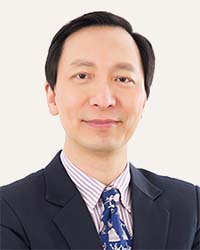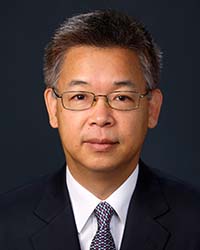Webinar Series
FinTech as a Financial Liberator
2021
Session Chair: Xiaoyan ZHANG
Xinyuan Chair Professor of Finance and Associate Dean at PBC School of Finance, Tsinghua University and Senior Fellow, ABFER
Shang-Jin WEI, N.T. Wang Professor of Chinese Business and Economy and Professor of Finance and Economics, Graduate School of Business and School of International and Public Affairs, Columbia University and Senior Fellow of ABFER
Co-authors:
Greg BUCHAK, Assistant Professor of Finance, Graduate School of Business, Stanford University
Jiayin HU, Assistant Professor of Finance, National School of Development and Researcher, Institute of Digital Finance, Peking University
Yiping HUANG, Sinar Mas Chair Professor of Finance of Economics, Deputy Dean of the National School of Development, and Director of the Institute of Digital Finance, Peking University
Speakers
-

Shang-Jin WEI
N.T. Wang Professor of Chinese Business and Economy and Professor of Finance and Economics, Graduate School of Business and School of International and Public Affairs, Columbia University
Shang-Jin Wei is N.T. Wang Professor of Chinese Business and Economy and Professor of Finance and Economics at Columbia University’s Graduate School of Business and School of International and Public Affairs.
During 2014-2016, Dr. Wei served as Chief Economist of Asian Development Bank and Director General of its Economic Research and Regional Cooperation Department. He was ADB’s chief spokesperson on economic trends and economic development in Asia, advised ADB’s President on economic development issues, led the bank’s analytical support for regional cooperation fora including ASEAN+3 (China, Japan, and Korea) and APEC, growth strategy diagnostics for developing member countries, as well as research on macroeconomic, financial, labor market, and globalization issues.
Prior to his Columbia appointment in 2007, he was Assistant Director and Chief of Trade and Investment Division at the International Monetary Fund. He was the IMF’s Chief of Mission to Myanmar (Burma) in 2004. He previously held the positions of Associate Professor of Public Policy at Harvard University, the New Century Chair in Trade and International Economics at the Brookings Institution, and Advisor at the World Bank.
He has been a consultant to numerous government organizations including the U.S. Board of Governors of the Federal Reserve System, United Nations Economic Commission on Europe, and United Nations Development Program, the Asian Development Bank, and to private companies such as PricewaterhouseCoopers. He holds a PhD in economics and M.S. in finance from the University of California, Berkeley.
Dr. Wei is a noted scholar on international finance, trade, macroeconomics, and China. He is a recipient of the Sun Yefang Prize for Distinguished Contributions to Economics (for the invention of the Competitive Saving Motive published in Journal of Political Economy), the Zhang Peifang Prize for Contributions to Economics of Development (for pioneering work on measurement of global value chains published in American Economic Review), and the Gregory Chow Award for Best Research Paper; some of his research was supported by a grant from the U.S. National Science Foundation.
Dr. Wei’s research has been published in top academic journals including American Economic Review, Journal of Political Economy, Quarterly Journal of Economics, Journal of Finance, Review of Financial Studies, Journal of International Economics, and Journal of Development Economics, and reported in popular media including Financial Times, Wall Street Journal, Economist, Business Week, Times, US News and World Report, Chicago Tribune, South China Morning Post, and other international news media. -

Yiping HUANG
Sinar Mas Chair Professor of Finance of Economics, Deputy Dean of the National School of Development, and Director of the Institute of Digital Finance, Peking University
Huang Yiping is Sinar Mas Chair Professor of Finance of Economics, Deputy Dean of the National School of Development, and Director of the Institute of Digital Finance, the Peking University. He served as a member of the Monetary Policy Committee at the People’s Bank of China between June 2015 and June 2018. Currently, he is a member of the External Advisory Group on Surveilance of the International Monetary Fund, and Research Fellow at the Financial Research Center of the Counselors’ Office of the State Council. He also serves as Chairman of the Academic Committee of China Finance 40 Forum, and a member of Chinese Economists 50 Forum. He is Editor of China Economic Journal and an Associate Editor of Asian Economic Policy Review. His research areas include macro economy, financial market and rural development.
Previously, he was a policy analyst at the Research Center for Rural Development of the State Council, research fellow and senior lecturer of economics at the Australian National University, General Mills International Visiting Professor of Economics and Finance at the Columbia Business School, Managing Director and Chief Asia Economist for Citigroup, Managing Director and Chief Economist for Emerging Asia for Barclays, and an Independent Director of China Life Insurance Ltd, Minmetal Trust Ltd and Mybank.
Prof Huang received his Bachelor of Agricultural Economics from Zhejiang Agricultural University, Master of Economics from Renmin University of China and PhD in Economics from Australian National University. -

Xiaoyan ZHANG
Xinyuan Professor of Finance, Associate Dean, PBC School of Finance, Tsinghua University and Senior Fellow of ABFER
Xiaoyan Zhang is the Xinyuan Chair Professor of Finance and Associate Dean at PBC School of Finance, Tsinghua University. She is also the Deputy Director of National Institute of Financial Research and Institute of Fintech Research at Tsinghua University, and the director of Xinyuan Fintech Research Center. Prof. Zhang received her B.A. in Economics from Peking University in 1997, and Ph.D. in Finance (with honor) from Columbia Business School in 2002. Before joining Tsinghua University, Prof. Zhang worked at the Johnson School of Management of Cornell University as an Assistant Professor of Finance, and the Krannert School of Management of Purdue University as Duke Realty Chair Full Professor of Finance and Finance Group Head. Currently, Professor Zhang is a senior fellow of the Asian Bureau of Finance and Economic Research (ABFER), and a senior financial expert of the Shanghai Stock Exchange. Professor Zhang served on the CSRC 17th Issuance Examination Committee, and currently serves on the World Economic Forum’s Global Future Council, China Global Economic Governance 50 Forum, and Expert Committee of National Internet Finance Association.
Professor Zhang’s research interests include international finance, empirical asset pricing, fintech and Chinese capital market. Many of her works have been published in Journal of Finance, the Journal of Financial Economics, the Review of Financial Studies and other top tier academic journals, and have won the best paper awards multiple times. Given her research excellence, Prof. Zhang is appointed as associate editor at Management Science, Financial Management, Journal of Banking and Finance and Journal of Empirical Finance. Her team’s research on Chinese capital market receives the highest level of grant from National Natural Sciences Foundation of China.
Professor Zhang enjoys teaching in global capital market, financial derivatives, risk management and empirical asset pricing for undergraduate, Master of Finance, Ph.D., MBA, financial engineering and executive programs. She received many teaching awards from Cornell, Purdue and Tsinghua University. Due to her significant contributions on teaching and research, Professor Zhang was named one of the “Global Top 40 under 40” business school professors.
- 1
Session Format
Each session lasts for 1 hour 10 minutes (25 minutes for the author, 25 minutes for the discussant and 20 minutes for participants' Q&A). Sessions will be recorded and posted on ABFER's web, except in cases where speakers or discussants request us not to.
Registration
Please register here. A unique Zoom webinar link will be sent to you two days before the event. (Notice: Videos and screenshots will be taken during each session for the purpose of marketing, publicity purposes in print, electronic and social media)

